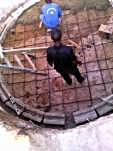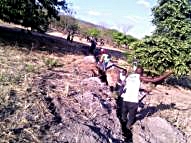This project has been completed under the direction of Peace Corps Volunteer Emily Hoppes. To read about the start of the project, CLICK HERE.
The project was a part of a larger Peace Corps Partnership project to create a water system for the school.
For the overall project, three above-ground tanks, and three underground water reserves were built. Also, rain gutters were added to both dormitories and the dining hall and connected to the water reserve already in place at the laboratory.
The additional Water Charity component included a 10,000-liter water reserve, built at the tap where the students currently go to fetch water.
A summary of Emily’s report is as follows:
The very first thing Ndanzi, the headmaster of Madibira Secondary School, talked to his volunteer about when she arrived at site was their water problem. At first, you wouldn’t notice that there’s a problem because Madibira village has a large river running through it. However, that river is about one kilometer downhill from the school. Water pumps and elevated tanks have failed in the past because of the school’s unfortunate location.
But Ndanzi did not want give up on bringing water to his students. So, the school’s Water Committee came up with a plan. They would install a series of underground tanks that all connect to each other, and that also connect to a large water reserve under the closest working water faucet. Water could then be moved from the water reserve to the school each night, using a pump, powered by the school’s small generator.
The volunteer also introduced the idea of rain gutters that empty into the underground tanks as well. Even though Madibira is a desert most of the year, rainy season yields a significant amount of water. So, the plan was in place, and it was time to make it happen.
The real success of this project was its capacity-building aspect. Because the grant proposal was delayed in getting approval, the project was started later than originally planned. The volunteer left Madibira before the bulk of the work was finished. But things still happened. The Madibira Water Committee worked tirelessly and overcame a lot of challenges.
Now the school has a beautiful water system that they feel connected to and protective of. And now the students of Madibira Secondary do not have to miss precious class and study time fetching water. As the headmaster said: “Our students can now focus on their studies and be more successful.”
We are grateful to Emily for completing this project, and helping 800 people with their water needs.

